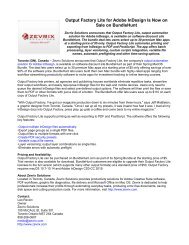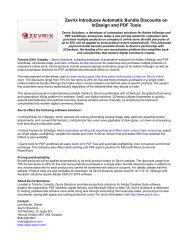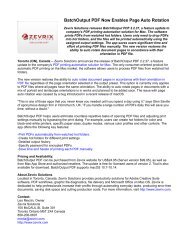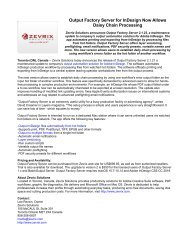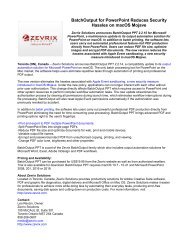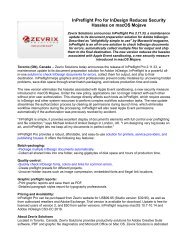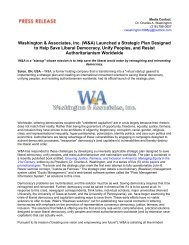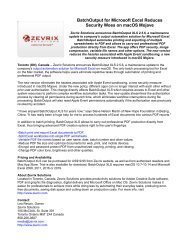Cyber Security Speaker Edgar Perez Keynotes Securities and Exchange Commission's Annual Conference
Edgar Perez, author of The Speed Traders and Knightmare on Wall Street, partnering with Terrapinn Training in 3-Day Masterclass Cybersecurity to bring key insights for CEOs and board members on cyber security.
Edgar Perez, author of The Speed Traders and Knightmare on Wall Street, partnering with Terrapinn Training in 3-Day Masterclass Cybersecurity to bring key insights for CEOs and board members on cyber security.
- TAGS
- staronepr
Create successful ePaper yourself
Turn your PDF publications into a flip-book with our unique Google optimized e-Paper software.
integrated into an organization's existing enterprise risk framework. The key is making it part of the<br />
mainstream of risk management within an organization. The most innovative companies today have<br />
recognized that cyber security is a customer experience <strong>and</strong> revenue opportunity, not just a risk that<br />
needs to be managed. Mr. <strong>Perez</strong> will explain why this must done across the entire organization <strong>and</strong> why<br />
the CEO <strong>and</strong> Board of Directors have the most important role to play.<br />
• The Impact of Brexit in the U.K <strong>and</strong> the World<br />
Companies inside <strong>and</strong> outside Britain's borders have warned that the Brexit decision is affecting their<br />
businesses, highlighting how the June vote for the UK to leave the European Union is having wide<br />
repercussions. The vote roiled equity markets worldwide <strong>and</strong> led to a devaluation of sterling amid<br />
concerns over a prolonged slowdown in consumer dem<strong>and</strong>. The U.K.'s decision to leave the European<br />
Union inflicted an immediate blow on the economy as business activity shrank at its fastest pace since the<br />
last recession seven years ago. The International Monetary Fund said that it had become less optimistic<br />
on global growth, <strong>and</strong> warned the damage could worsen if confidence falters among investors <strong>and</strong><br />
companies, as fears abound over businesses <strong>and</strong> customers reining in spending during a period of<br />
uncertainty for the UK as it negotiates the terms of its exit. Mr. <strong>Perez</strong> will identify the world economies that<br />
will feel the lion's share of the short <strong>and</strong> long-term pain to come.<br />
• Blockchain <strong>and</strong> its impact on Finance<br />
Blockchain technology (the software behind the digital currency, Bitcoin) offers an opportunity to overhaul<br />
existing business models, including banking infrastructure, approach to settlements <strong>and</strong> customer<br />
interactions. Now it is only a matter of time before the broader financial services <strong>and</strong> banking industries<br />
shift to blockchain <strong>and</strong> network-based approaches. The application possibilities are endless, improving the<br />
way we hold <strong>and</strong> transfer secure goods from money to deeds to music to intellectual property. In fact,<br />
blockchain, as a pure platform technology, may be able to cut out the middlemen (or middle companies)<br />
everywhere, even disrupting other disruptors like Airbnb or Uber. Mr. <strong>Perez</strong> will explain why the question is<br />
not whether network business models supported by blockchain technology will disrupt organizations, but<br />
when.<br />
• The Biggest Risks for Financial Markets<br />
Constant regulatory changes <strong>and</strong> technological evolution have transformed the financial l<strong>and</strong>scape so<br />
profoundly since the advent of the first electronic networks in the early 1970s. Regulators around the world<br />
are now in a race to respond to the evolution of technology in financial markets <strong>and</strong> prevent its operational<br />
challenges from becoming the biggest risk for financial markets. However, when considering technology<br />
<strong>and</strong> the cyber l<strong>and</strong>scape, errors are bound to happen. Financial services firms are expected to have<br />
deployed the most sophisticated defense systems against cyberattacks. Trading firms are expected to<br />
have controls in place <strong>and</strong> invest in the technology to keep up to date. Most companies would realize the<br />
need of these investments <strong>and</strong> honestly attempt to implement them, but their IT departments would soon<br />
hit a wall, because of direct involvement from senior management <strong>and</strong> boards of directors. Compliance<br />
actions against those who missed their importance will go a long way toward restoring investor confidence<br />
<strong>and</strong> limiting the impact of the biggest risk for financial markets.<br />
• Finance in the New Global Economy<br />
Until quite recently, globalization was seen as a one-way street. Multinationals, which led the charge four<br />
decades or so ago into growing global markets, were its ambassadors, <strong>and</strong> American <strong>and</strong> European<br />
workers, whose wages <strong>and</strong> upward mobility were flattened, were feeling left out. The core idea was that<br />
globalization, technological innovation <strong>and</strong> unfettered free trade would erase historical <strong>and</strong> geographic<br />
boundaries, making the world ever more economically interconnected <strong>and</strong> alike. Developed economies<br />
would come under more <strong>and</strong> more competitive pressure from eager upstart nations. Now we are entering<br />
a new age of volatility. Financiers will become less important, manufacturers more so. Blue collar jobs will<br />
go high tech. Robots will replace Chinese workers. Mr. <strong>Perez</strong> will discuss why finance st<strong>and</strong>s now in front<br />
of its biggest transformation triggered not by any of the financial conglomerates that dominate the world<br />
today but by obscure startups that could be working already in garages in Silicon Valley, Shanghai, Kiev or<br />
Delhi.





